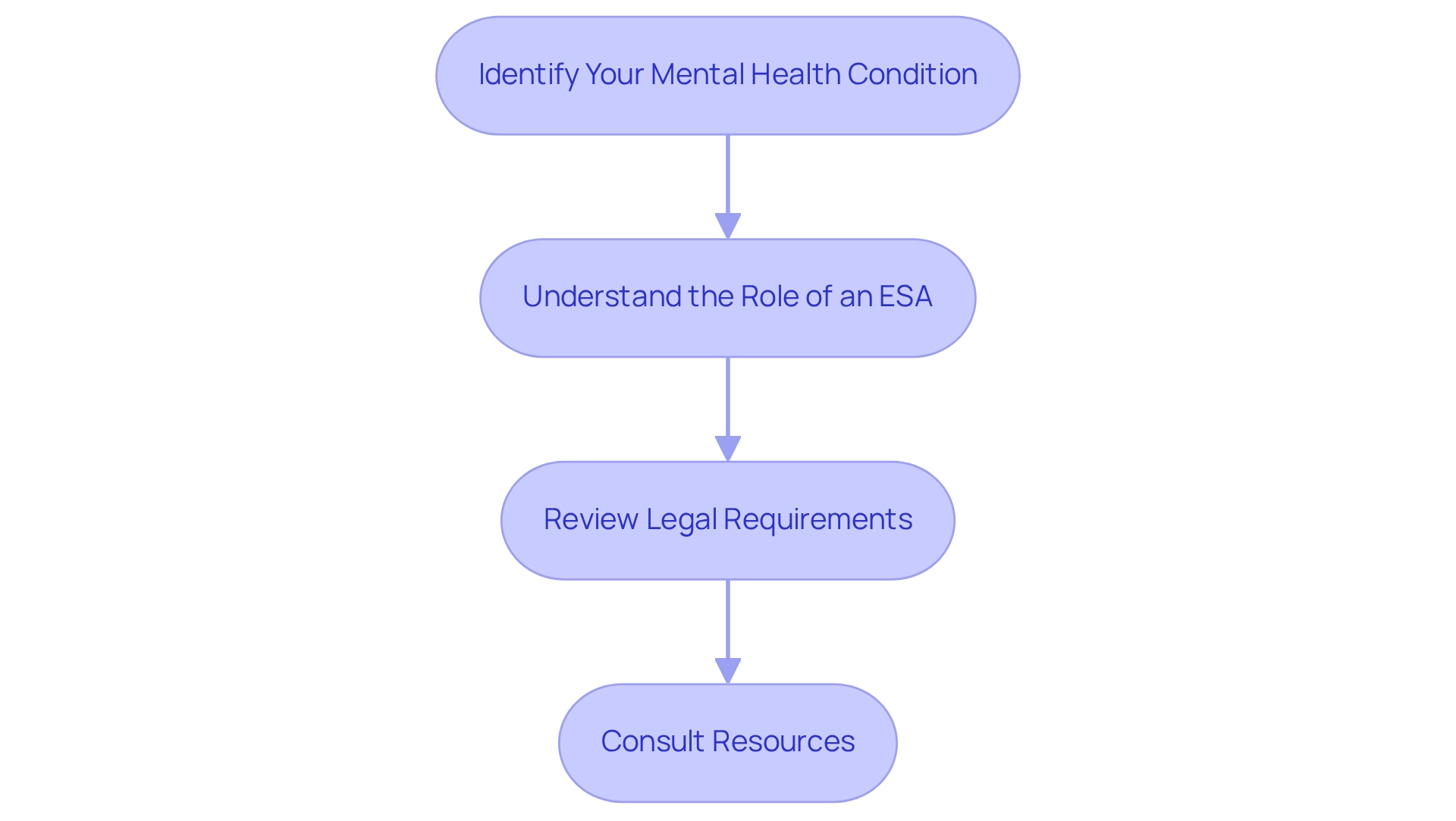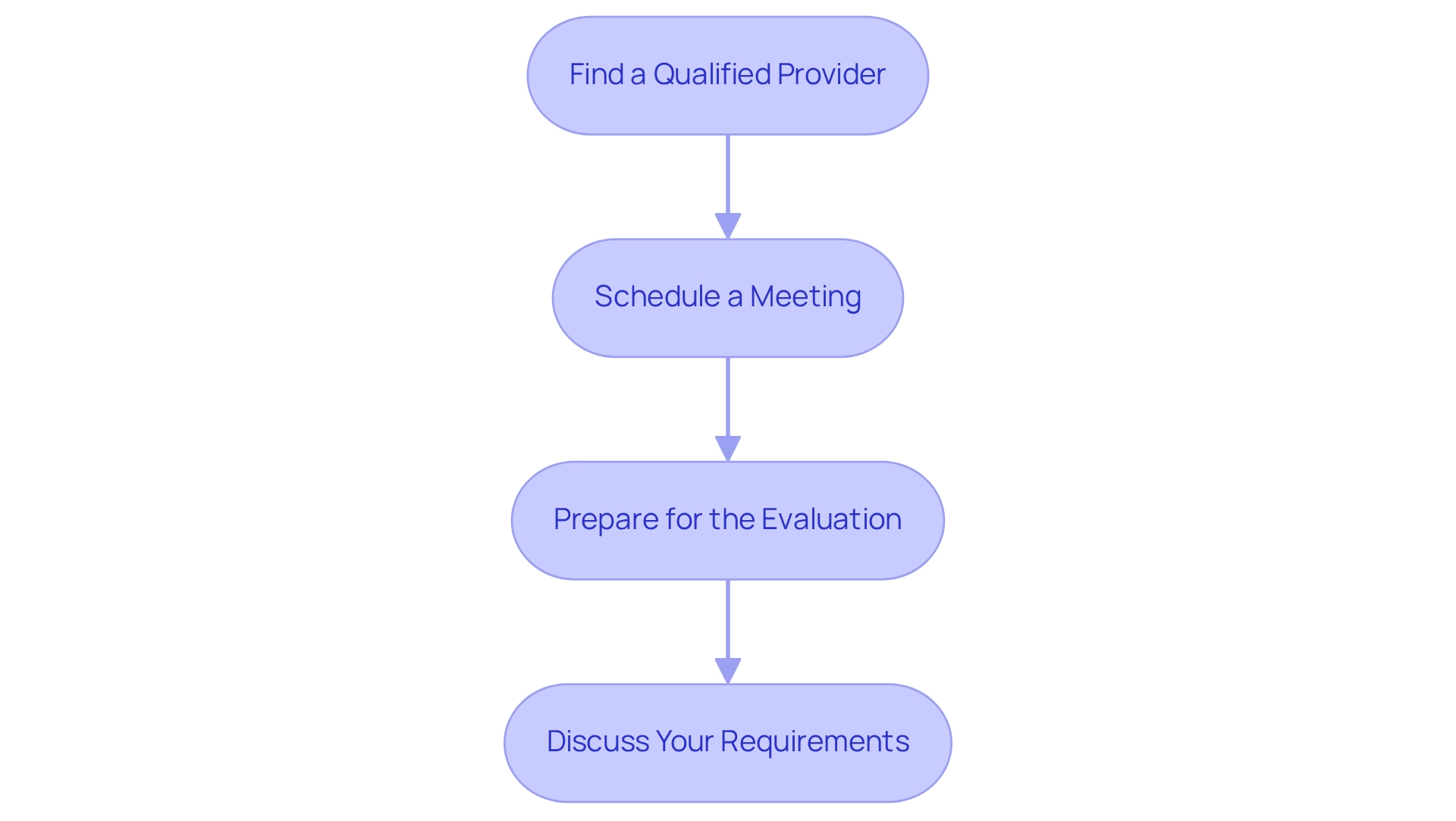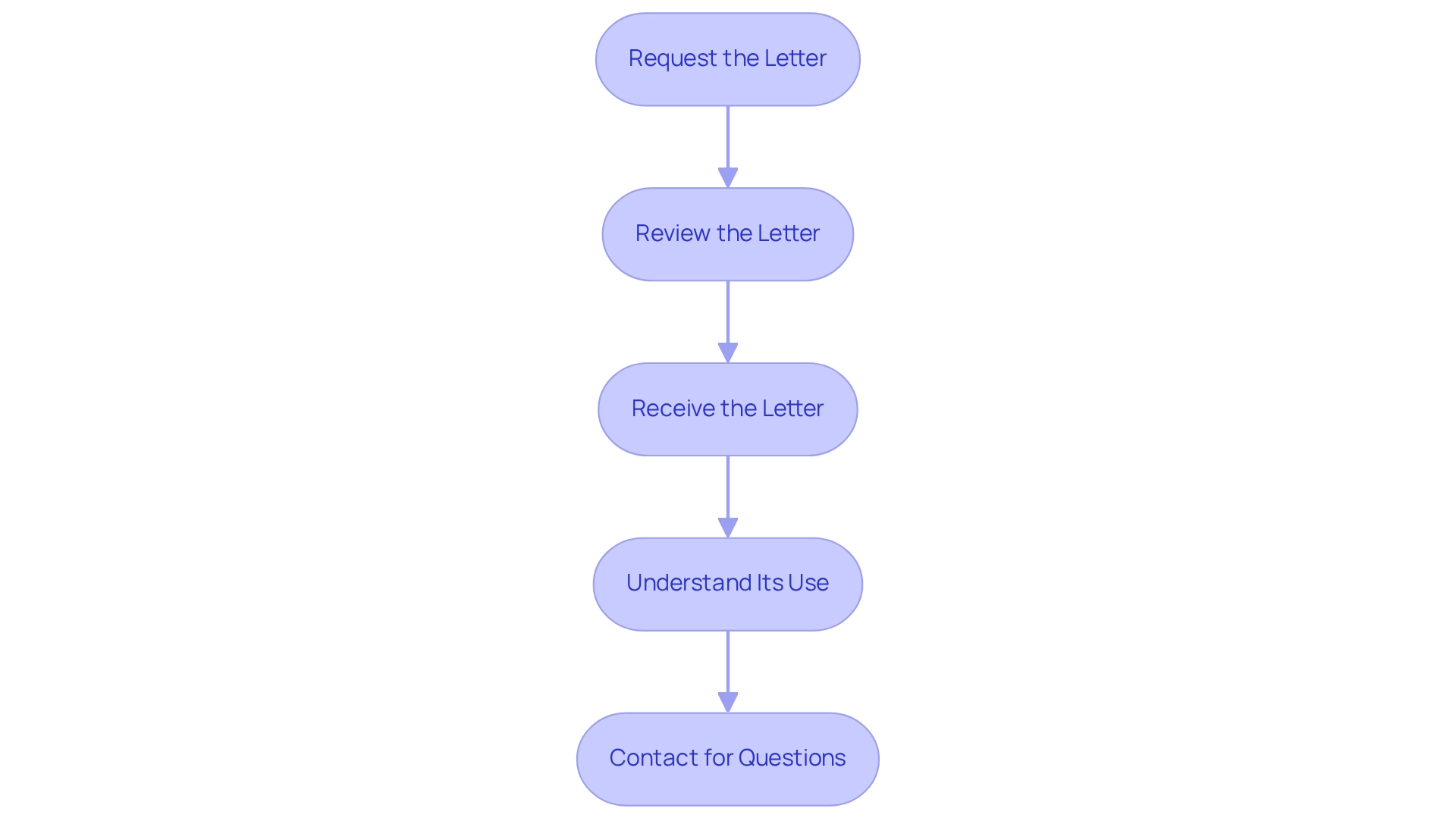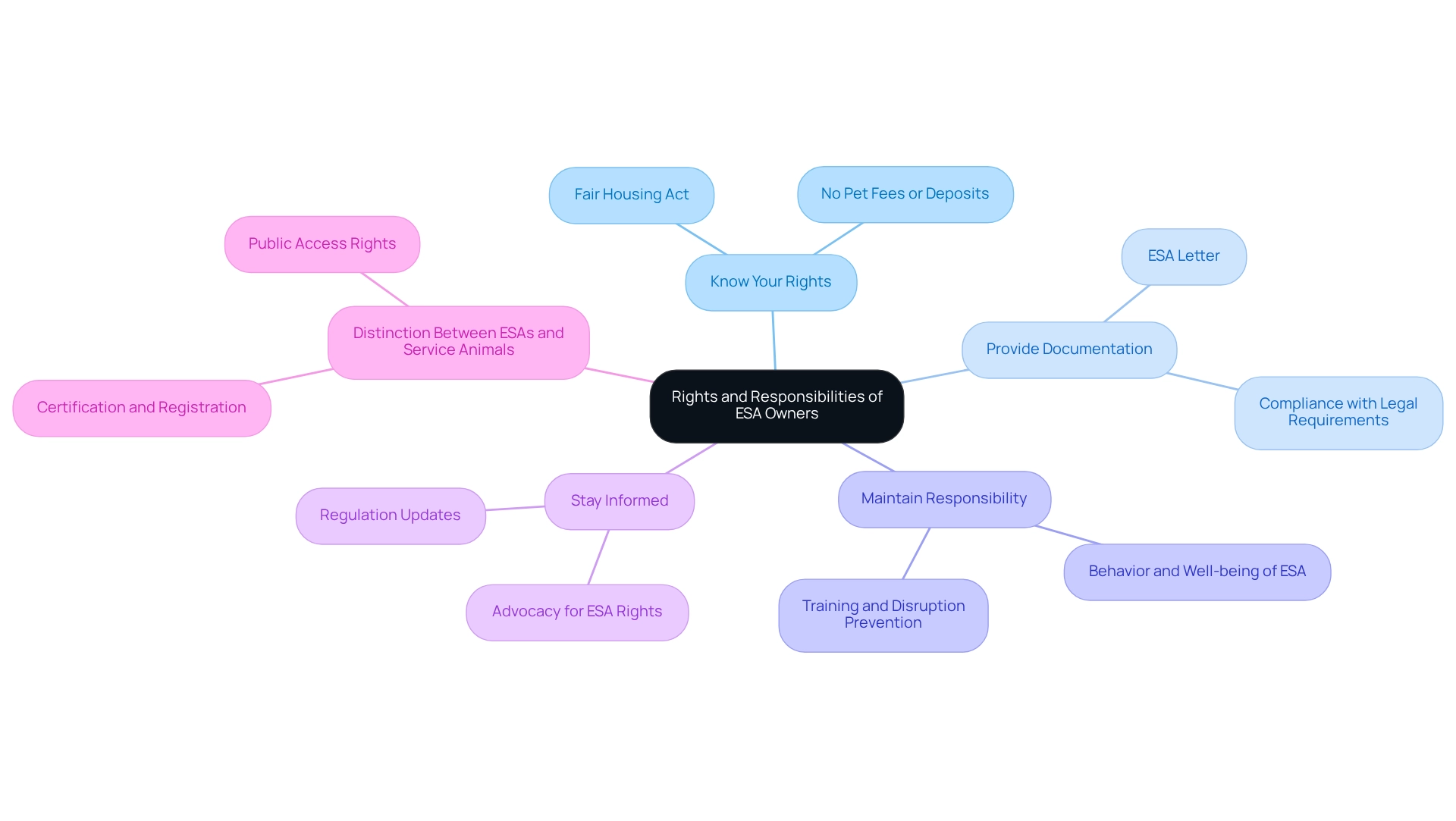

4 Steps to Obtain Your Emotional Support Cat Certification
by Lena Park
Last updated: July 8, 2025
Verified and Approved by:
Angela Morris,
MSW, LCSW
Fact Checked

Overview
If you’re considering obtaining your emotional support cat certification, it’s essential to first assess your eligibility. This involves identifying your mental health condition and understanding the significant role that an emotional support animal (ESA) can play in your life. It’s also important to review the legal requirements and consult with a licensed mental health professional who can guide you through this process.
The journey can feel overwhelming, but remember, you’re not alone. Many individuals face similar struggles, and there is support available. The article outlines a structured process that includes:
- Gathering the necessary documentation
- Receiving an official ESA letter
This letter not only affirms your need for an ESA but also empowers you to advocate for your rights and responsibilities as an ESA owner.
By understanding these steps, you can feel more informed and prepared, ensuring that you have the support you need to navigate your emotional journey. Your emotional well-being is important, and taking these steps is a positive move toward nurturing it.
Introduction
Navigating the world of emotional support animals (ESAs) can be both empowering and overwhelming for those seeking comfort through companionship. Many individuals face emotional challenges stemming from mental health issues, which can leave them feeling isolated and in need of support. Understanding the eligibility, legal requirements, and responsibilities associated with having an emotional support cat is crucial in this journey toward healing. This article gently explores the essential steps to:
- Assess eligibility
- Consult with mental health professionals
- Obtain the necessary documentation
It also aims to clarify the rights and responsibilities that come with being an ESA owner. By equipping oneself with knowledge and understanding, individuals can effectively advocate for their needs and enhance their emotional well-being, knowing that support is available to guide them along the way.
Assess Your Eligibility for an Emotional Support Cat
To assess your eligibility for an emotional support cat, it’s important to consider a few thoughtful steps:
- Identify Your Mental Health Condition: Take a moment to reflect on whether you have a diagnosed mental health condition, such as anxiety, depression, PTSD, or another emotional disorder. It may be necessary to gather documentation from a mental health professional to assist you in obtaining your emotional support cat certification.
- Understand the Role of an ESA: Emotional support animals, including those with emotional support cat certification, provide comfort and companionship to individuals facing mental health challenges. Unlike service animals, which are trained to perform specific tasks, ESAs offer a nurturing presence that can help alleviate symptoms. They are recognized under the Fair Housing Act, allowing for housing accommodations even in pet-restricted areas, which can be a significant relief.
- Review Legal Requirements: Familiarize yourself with the legal definitions and requirements for ESAs in your area. Understanding the Fair Housing Act and its implications for assistance animals, such as those requiring emotional support cat certification, is essential for ensuring your rights and access to housing, providing you with peace of mind.
- Consult Resources: Consider utilizing online resources or questionnaires that can help you determine if you qualify for an emotional support cat certification. Websites like Wellness Wag offer guidance and initial assessments, assisting you in navigating the process of obtaining Emotional Support Animal letters. Remember, you are not alone in this journey, and support is available to help you find the companionship you need.

Consult a Licensed Mental Health Professional
If you’re considering consulting a licensed mental health professional to obtain your Emotional Support Animal (ESA) letter through Wellness Wag, here are some gentle steps to guide you:
- First, it’s important to find a qualified provider. Look for a licensed therapist, psychologist, or psychiatrist who specializes in mental health issues. You might search online directories or ask for referrals from friends or family who understand your journey.
- Next, schedule a meeting. Reach out to Wellness Wag to arrange a personalized telehealth consultation with a compassionate licensed physician. This is your opportunity to openly discuss your mental health background and the reasons you feel that obtaining an emotional support cat certification could help you.
- As you prepare for the evaluation, gather any relevant medical records. It’s essential to be open about your feelings during the consultation. After your evaluation, if it’s deemed appropriate, you can expect to receive a professionally crafted ESA letter with legal recognition within 24 hours, providing you with a sense of relief and support.
- Finally, during the appointment, take the time to discuss your requirements. Clearly convey your need for emotional support cat certification. The professional will assess your situation with care and determine if an ESA is the right fit for you. Remember, this process is about finding the support you need, and you are not alone on this journey.

Receive Your Official ESA Letter
Navigating mental health challenges can be incredibly difficult, and finding the right support is essential. If you’ve consulted with a licensed mental health professional and are considering an Emotional Support Animal (ESA), here are some vital steps to help you obtain your official ESA letter with care and compassion:
- Request the Letter: Gently ask your mental health professional for an ESA letter. It’s important that this letter includes your name, the date, the professional’s license number, and a clear statement affirming your need for a support companion due to your mental health condition.
- Review the Letter: Take a moment to verify that the letter meets legal requirements. It should clearly specify your mental health condition and the necessity of an emotional support cat certification for your psychological well-being, in accordance with housing regulations that protect your rights.
- Receive the Letter: Typically, you can expect the letter to be issued within a few days. Remember to keep both digital and physical copies for your records, as these documents are crucial for asserting your rights.
- Understand Its Use: Familiarize yourself with how to use the letter for housing and travel. Understanding your rights under the Fair Housing Act and the Air Carrier Access Act is key, as these laws protect your ability to live with your ESA in pet-restricted accommodations. Importantly, landlords cannot deny an ESA request solely based on the breed of the pet unless there is documented proof of previous harm caused by that specific breed. For travel, note that Air Canada no longer recognizes comfort creatures, but psychiatric service dogs can travel with the appropriate documentation. Be sure to complete the U.S. DOT form and notify the Medical Assistance Desk 48 hours before your flight. A PSD letter can facilitate a smoother check-in process.
If you have any questions about the ESA process, please reach out to Wellness Wag at [email protected]. By following these steps, you can ensure that you have the necessary documentation, such as emotional support cat certification, to support your mental health needs while navigating the challenges of housing and travel.

Understand Your Rights and Responsibilities as an ESA Owner
As an emotional support animal owner, obtaining emotional support cat certification is essential to understand your rights and responsibilities to create a harmonious living environment.
Know Your Rights: Under the Fair Housing Act, you have the right to live with your emotional support cat in housing that generally restricts pets. This law ensures that landlords cannot impose pet fees or deposits for ESAs, reinforcing your right to have your beloved companion by your side.
Provide Documentation: Be prepared to present your ESA letter to landlords or property managers when requested. This letter is vital as it confirms your need for your emotional support cat certification, ensuring compliance with legal requirements.
Maintain Responsibility: As an ESA owner, you hold the responsibility for your cat’s behavior and well-being. It is crucial to ensure that your ESA is well-trained and does not disrupt your living space, as this can impact your rights under the Fair Housing Act. Legal experts emphasize that ESA owners must actively oversee their companions’ behavior in order to uphold their emotional support cat certification rights.
Stay Informed: Regularly update yourself on any changes in regulations regarding assistance animals. Being informed about your rights empowers you to advocate effectively for your emotional support cat certification in various situations.
It’s important to understand that while therapy animals provide significant benefits, they differ from service dogs, which are trained to perform specific tasks for individuals with disabilities. Service dogs enjoy public access rights under the Americans with Disabilities Act (ADA) and may require certification or registration from recognized organizations. Recent statistics indicate that approximately 70% of property owners now permit assistance animals, reflecting a growing recognition of their importance in enhancing mental well-being. Moreover, real-life stories demonstrate how ESA owners have successfully advocated for their rights, highlighting the value of being informed and prepared. Research shows that emotional support animals can significantly alleviate symptoms of mental health conditions, fostering resilience and improving daily functioning for their owners.

Conclusion
Navigating the journey of obtaining an emotional support cat can feel overwhelming, especially for those grappling with mental health challenges. It begins with assessing your eligibility, which involves recognizing your mental health conditions and understanding the legal framework surrounding emotional support animals. Consulting with a licensed mental health professional is not just a step; it’s a vital part of the process, ensuring you have the necessary documentation to make this journey both legitimate and supportive.
Once you secure your ESA letter, it is essential to understand the rights and responsibilities that come with being an emotional support animal owner. This includes knowing your rights under the Fair Housing Act and ensuring the well-being of your cat. Are you prepared to present documentation when needed? Staying informed about the evolving landscape of ESA regulations can further empower you to advocate effectively for your needs.
Emotional support animals play a profound role in enhancing emotional well-being, offering companionship and comfort during difficult times. By equipping yourself with the right knowledge and resources, you can confidently navigate the complexities of ESA ownership, ensuring you receive the support necessary for your mental health journey. Though the path may present challenges, the rewards of companionship and emotional relief are truly invaluable. Remember, you are not alone in this journey; support is available, and your emotional well-being matters.
Frequently Asked Questions
How can I assess my eligibility for an emotional support cat?
To assess your eligibility, reflect on whether you have a diagnosed mental health condition such as anxiety, depression, or PTSD, and consider gathering documentation from a mental health professional.
What is the role of an emotional support animal (ESA)?
An ESA provides comfort and companionship to individuals facing mental health challenges. Unlike service animals, they are not trained for specific tasks but offer a nurturing presence that can help alleviate symptoms.
What legal protections do emotional support cats have?
Emotional support cats are recognized under the Fair Housing Act, which allows for housing accommodations even in pet-restricted areas, ensuring individuals have access to housing that supports their mental health needs.
What should I review regarding legal requirements for emotional support animals?
Familiarize yourself with the legal definitions and requirements for ESAs in your area, particularly the Fair Housing Act, to understand your rights and access to housing.
Are there resources available to help determine my qualification for an emotional support cat?
Yes, you can use online resources or questionnaires, such as those available on websites like Wellness Wag, which provide guidance and initial assessments for obtaining emotional support animal letters.
Certify Your Emotional Support Animal Today

Why You Can Rely on Us?
At Wellness Wag, we believe your pet deserves care rooted in both science and compassion. Each article is carefully researched, written in clear language for pet owners, and then reviewed by qualified professionals to ensure the information is evidence-based, current, and practical for real-life care. Our goal is to help you feel confident in making informed decisions about your pet’s health and well-being.
Reviewed by
Angela Morris, MSW, LCSW
Angela is a licensed clinical social worker with 20 years of experience in patient advocacy and community mental health. She has assisted numerous clients with ESA evaluations and brings a deep understanding of disability accommodations, ensuring that all information is accurate, supportive, and practical.

Written by :
Lena Park
Last Updated :
July 8, 2025












